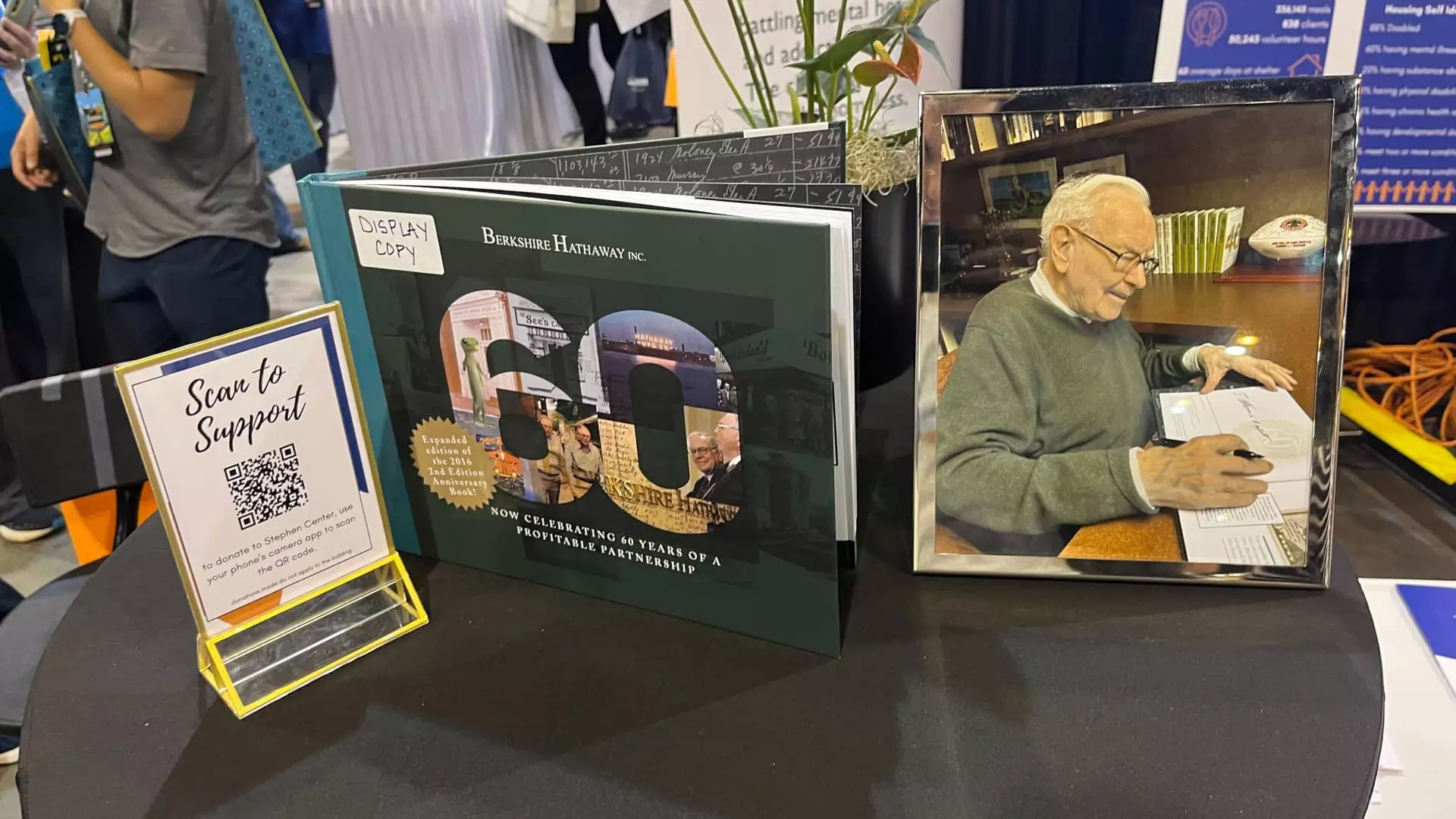In the heart of Omaha, a palpable excitement lingered in the air as fortunes collided with the spirit of philanthropy. The annual meeting of Berkshire Hathaway wasn’t just a corporate event; it transformed into an opulent spectacle in which anticipation soared, driven by the allure of exclusive memorabilia signed by the esteemed Warren Buffett. Those rare artifacts — particularly the signed anniversary book, “60 Years of Berkshire Hathaway” — became coveted items, igniting a fierce bidding war that culminated in over $1.3 million raised for local charity, the Stephen Center.
Buffett, at the venerable age of 94, injected a sense of urgency and value into the event by pledging to match every dollar raised. To many, this wasn’t merely an auction; it was an opportunity to contribute to a noble cause while basking in the glow of a historic business legacy. As bidders engaged in a frenzied race to secure their piece of Buffett’s history, it raised questions about the intersection of wealth, celebrity, and altruism in American society.
Astonishing Donations: The Ripple Effect
The impact of this auction transcended mere dollars. Take the case of Matthew Rodriguez, a 43-year-old real estate professional who placed a $50,000 bid, thrilled not only by the prospect of owning a priceless artifact but also by the knowledge that his money would help the Stephen Center in tangible ways. Rodriguez’s story is emblematic of a larger trend among Berkshire shareholders who see their investments not just as monetary transactions but as opportunities for enhancing community welfare.
Interestingly, many shareholders were proactive in sending donations directly to the Stephen Center even before understanding how the signed items would be made available. This speaks volumes about the familial regard Buffett commands; a simple mention of his endorsement was enough to propel individuals to contribute significantly, often without expectation of recognition or reward. Indeed, goodwill and empathy emerged as driving forces, reflecting a wider narrative of communal responsibility and the ethical obligations of wealth.
Shifting Paradigms: A Focus on Accountability and Transparency
Underpinning Buffett’s philanthropic gestures is a fundamental desire to promote local causes and foster awareness about the societal issues that often lurk beneath the surface. The funds raised will go toward renovations aimed at expanding addiction recovery programs and creating housing for women and children — a response to rising homelessness in Omaha, which has surged nearly 10% in the past year. In essence, Buffett’s initiatives shine a light on the pressing needs within communities, challenging stakeholders to rethink charitable contributions as a moral imperative rather than a mere afterthought.
The Stephen Center’s Chris Knauf captures this sentiment when he notes the unprecedented reach of contributions emanating from every corner of the globe, thanks to Buffett’s influence. The realization that wealthy individuals can connect internationally yet still prioritize local needs signals a shift in philanthropic thinking — one in which accountability and direct impact become paramount. This approach aligns with a more liberal view of wealth distribution: the belief that prosperity should serve the community, not merely pad personal bank accounts through generational wealth.
A Reflection of Values: Charity in the Shadow of Wealth
While the silent auction was a spectacle of wealth in action, it also raised critical questions about wealth disparity. The sheer amount spent on Buffett’s memorabilia is a stark reminder of the global imbalance of resources. Yet, beyond the numbers lies a profound message: wealth, when shared, becomes a source of hope and change. Buffett’s long-standing address against dynastic wealth fosters a culture in which individuals are encouraged to leverage their fortunes for communal betterment rather than hoarding.
Amidst this ongoing dialogue, Buffett’s charitable mindset serves as a model for affluent individuals everywhere. Having committed to donating 99% of his fortune, he has actively championed the idea that philanthropy is not just a choice—it is a responsibility. By opting to support local initiatives like the Stephen Center, he underscores the significance of acknowledging one’s roots while inspiring future generations to act with a similar ethos.
The Auction’s Lasting Legacy
Ultimately, events like this encapsulate the notion that wealth should be a tool for empowerment, not an impediment. The exhilarating atmosphere of the auction at the Berkshire Hathaway meeting did more than raise considerable funds; it solidified a culture of giving that Warren Buffett has embodied throughout his career. This annual gathering will resonate beyond the moment, influencing both the current shareholders and the future custodians of wealth to continue using their fortunes for the greater good.
As we look forward, the story of Buffett and his dynamism toward charitable contributions will remain a pivotal point of discussion in the spheres of business ethics, wealth distribution, and community obligation. The stage has been set for a new narrative in which philanthropy serves as both a legacy and a blueprint for those looking to make their mark—not just financially, but socially as well.

